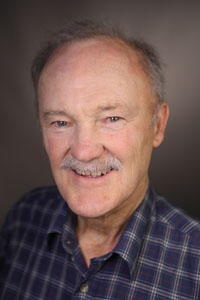News
John W. Hutchinson is the Abbott and James Lawrence Professor of Engineering and Gordon McKay Professor of Applied Mechanics, Emeritus. (Photo by Eliza Grinnell, SEAS Communications.)
Cambridge, Mass. - May 14, 2013 - John W. Hutchinson, Abbott and James Lawrence Professor of Engineering and Gordon McKay Professor of Applied Mechanics, Emeritus, has been elected to foreign membership in the Royal Society.
He was among eight Foreign Members and 44 new Fellows welcomed on May 3 by the United Kingdom's elite national academy.
Hutchinson is a seminal scholar in the field of solid mechanics and materials engineering, and is more highly cited than any other researcher in this area.
Hutchinson studied engineering mechanics as an undergraduate at Lehigh University. After earning his Ph.D. in mechanical engineering at Harvard in 1963, he spent a year in Denmark before returning to join the Harvard faculty, where he very soon made dramatic contributions to the study of buckling in elastic structures.
Over a 50-year career at Harvard, he has been one of the major developers of nonlinear fracture mechanics. He has made groundbreaking contributions in micromechanics, including plasticity of polycrystals, cracking of fiber-reinforced ceramics, and delamination of thermal barrier coatings.
For example, ceramic thermal barrier coatings (TBCs) are widely used in aircraft and power generation turbines to shield the engine blades and other metal components from high temperatures. However, the use of TBCs contributes to an industry trend toward engines that operate at even higher temperatures, which threatens the durability of the coatings.
Concern for plastic deformation at the scale of microns led to his publications in strain-gradient plasticity, which have sparked a world-wide explosion in research on this topic.
“Science helps us to better understand ourselves and the natural world around us and has a huge role to play in future economic prosperity and the health of our planet and its 7 billion people," said Sir Paul Nurse, President of the Royal Society, in a press release. "In the coming decades we are going to find ourselves more and more dependent on the solutions."
"These scientists who have been elected to the Fellowship of the Royal Society have already contributed much to the scientific endeavour following in the footsteps of pioneers such as Newton, Darwin and Einstein," Nurse added, "and it gives me great pleasure to welcome them into our ranks.”
About the Royal Society
The Royal Society is a self-governing Fellowship of many of the world’s most distinguished scientists drawn from all areas of science, engineering, and medicine. The Society’s fundamental purpose, reflected in its founding Charters of the 1660s, is to recognise, promote, and support excellence in science and to encourage the development and use of science for the benefit of humanity. The Society has played a part in some of the most fundamental, significant, and life-changing discoveries in scientific history and Royal Society scientists continue to make outstanding contributions to science in many research areas.
Cutting-edge science delivered direct to your inbox.
Join the Harvard SEAS mailing list.
Scientist Profiles
John W. Hutchinson
Abbott and James Lawrence Professor of Engineering and Gordon McKay Professor of Applied Mechanics, Emeritus

